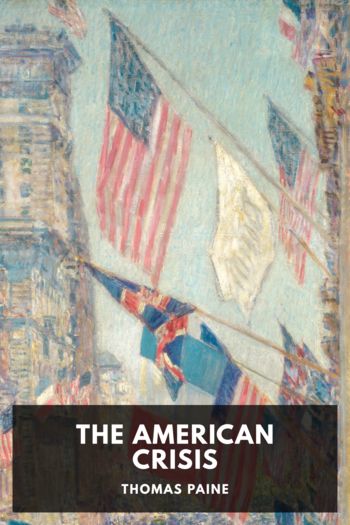Fateful Lightning: A New History of the Civil War & Reconstruction, Allen Guelzo [best thriller novels of all time txt] 📗

- Author: Allen Guelzo
Book online «Fateful Lightning: A New History of the Civil War & Reconstruction, Allen Guelzo [best thriller novels of all time txt] 📗». Author Allen Guelzo
THE MAKING OF THE ARMIES
The volunteer who mastered the intricacies of his weapon and drill would leave his “camp of instruction” with the rest of his regiment and be shipped off to wherever the main armies might be at that moment. From that point on, the basic organizational unit, and the unit most soldiers used to identify themselves, was the regiment. Unlike the regimental system of the British army, the volunteer regiments of the Civil War had no previous history. They were the creations of 1861, having no existing traditions or institutions with which to shelter and socialize the new recruit, no already existing cadres of officers or non-commissioned officers, and no barracks or recruiting depots. It fell on the volunteers themselves to turn their regiments into either livable facsimiles of home life or freewheeling moral carousels. Some units, like the two regiments of Hiram Berdan’s United States Sharpshooters, prided themselves on living “like a band of brothers, imbued with the one feeling of patriotism in their voluntary enlistment for three years.” Others converted the long stretches of empty camp time into study halls, as did a young lieutenant in the Confederate Army, Basil Gildersleeve, who improved his command of “his English classics” and “his ancient classics.” In the 7th Ohio, the company recruited from the pious students of Charles Finney at Oberlin College made sure that “daily prayer meetings were established.” St. Clair A. Mulholland described the camp of his 116th Pennsylvania as a religious idyll where “seldom was an obscene word or an oath heard in the camp” and “meetings for prayer were of almost daily occurrence, and the groups of men sitting on the ground or gathered on the hill side listening to the Gospel were strong reminders of the mounds of Galilee when the people sat upon the ground to hear the Savior teach.”59
In other regiments, the abrupt transition from domestic routine to the poorly structured life of an army camp meant crossing over a social line where the customary behavioral restraints might mean very little. Prostitution, drunkenness, gambling, and thievery were rife in both Federal and Confederate regiments. “Gen. Meagher got up this morning & drank about a quart of whiskey,” wrote a disgusted Theodore Gates in his diary in 1864, “& went to bed again & has been there all day drunk.” The 154th New York were “good companions” for the most part, “but at the same time there is much going on in camp that is not intended to improve the morals nor the manners or the mind.” Army life “seems adapted to make a man coarse & rough,” and “many a man does that here that he would be utterly ashamed to do at home and excuses himself by saying that others do it or that it is customary in the Army to do it.” Edward King Wightman found that “most of our common soldiers are scarcely above brutes by nature.”
The privates, of course, are not such people as you or any sensible man would choose, or perhaps I should say could endure, as associates. As a mass, they are ignorant, envious, mercenary, and disgustingly immoral and profane. Being as they are here free from the restraints of civil law, they give loose rein to all their vices and make a boast of them. In our whole regiment, I know no private who will not curse and swear and but few who will not, when circumstances favor, rob and steal or, as they more euphon[i]ously style the operations, “briz things.”60
On paper, Civil War regiments were supposed to contain eight to ten companies of approximately 100 enlisted men and officers each, commanded by a colonel, so the full strength of a regiment ought to have been, more or less, 1,000 men. In the Union Army, however, regiments were often allowed to dwindle down to between 200 and 300 men, as the ranks were thinned by sickness and casualties. The reason for this neglect was nakedly political. Since the volunteer regiments were raised by the states, it was easier for many Northern governors to create new regiments, and thus create new openings for cronies whom they wished to reward with officers’ commissions, than to keep refilling the old regiments.
The result was an army of shadow units. When Union general John A. Dix reviewed George Washington Whitman’s 51st New York at Newport News, Virginia, in February 1863, the 51st “could only muster 140 men,” and “when we came along with our old flag all torn to pieces, I saw the old. Gen. eye the flag and Regt. and shake his head.”61 In many cases, it was up to the regimental commanding officer to keep up a supply of new enlistments from back home for his regiment, but most commanders could ill afford to detail their precious supply of junior officers for recruiting duty behind the lines. The Confederates armies, on the other hand, recognized the value of integrating new recruits and replacements with veteran combat regiments, and so the Confederate regiments were more likely to maintain their organizational integrity throughout the war than Union regiments.
If the regiment was the basic unit of identity, the brigade was soon recognized as the basic unit of maneuver on the Civil War battlefield, and most of the movement and action in Civil War combat occurred in groups of brigades. The average brigade consisted of four or five regiments, commanded by a brigadier general, and sometimes they acquired an identity of their own to rival the individual regimental identities—the Iron Brigade of the Army of





Comments (0)